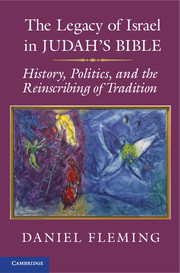Book contents
- Frontmatter
- Contents
- Preface
- Acknowledgments
- List of Abbreviations
- Part I Introduction
- 1 Why Israel?
- 2 Israel without Judah
- Part II Israelite Content in the Bible
- Part III Collaborative Politics
- Part IV Israel in History
- Bibliography
- Index of Biblical Texts
- Index of Near Eastern Texts
- Subject Index
- References
2 - Israel without Judah
Published online by Cambridge University Press: 05 August 2012
- Frontmatter
- Contents
- Preface
- Acknowledgments
- List of Abbreviations
- Part I Introduction
- 1 Why Israel?
- 2 Israel without Judah
- Part II Israelite Content in the Bible
- Part III Collaborative Politics
- Part IV Israel in History
- Bibliography
- Index of Biblical Texts
- Index of Near Eastern Texts
- Subject Index
- References
Summary
This investigation has the aim of probing more deeply the two separate identities that framed the early formation of biblical writing, the kingdoms of Israel and Judah. These two names were not the only ones by which the two kingdoms were known, and they could be used to identify people without reference to kingdoms, certainly after and probably before those monarchies. Nevertheless, these labels offer a point of entry into the social and political structures that shaped early biblical writing. The names Israel and Judah do not offer a universal key to fixed identities through time, and they belong to a complex geography of shifting identities.
Understanding the limitations of names, it is necessary to acknowledge exactly what we have: in this application to the two kingdoms, Israel and Judah are political identities. As such, they apply to large-scale social structures, with large populations that incorporate multiple regions, numerous settlements, and countless households. Their differences and eccentricities will have to do with how each one operates as a polity, regardless of how homogeneous each may be internally or how similar or different their local communities may be across this political divide. In the Bible, where whole peoples are often in view, contrasts between the political cultures of Israel and Judah can help us understand the perspectives from which stories were created or revised. However village life in Israel may have resembled the same in Judah or Moab, certain patterns accompanied the constitution of each as politically united. Such patterns were bound up with politics, but they had implications for religion, for economics, and for any other aspects of society that were affected by political lines of organization and authority. In this second introductory chapter, I will outline a specific hypothesis of political contrast and its implications for the construction of the Bible's primary narrative in Genesis through Kings.
- Type
- Chapter
- Information
- The Legacy of Israel in Judah's BibleHistory, Politics, and the Reinscribing of Tradition, pp. 17 - 36Publisher: Cambridge University PressPrint publication year: 2012



